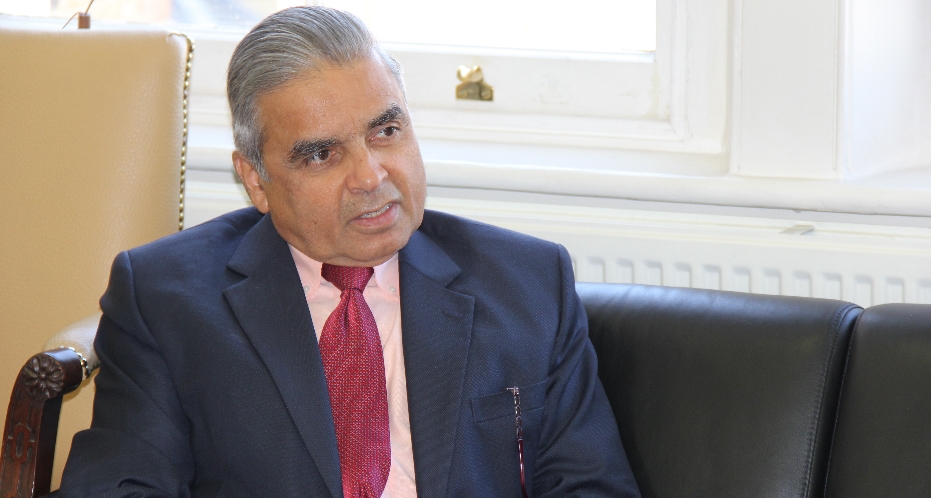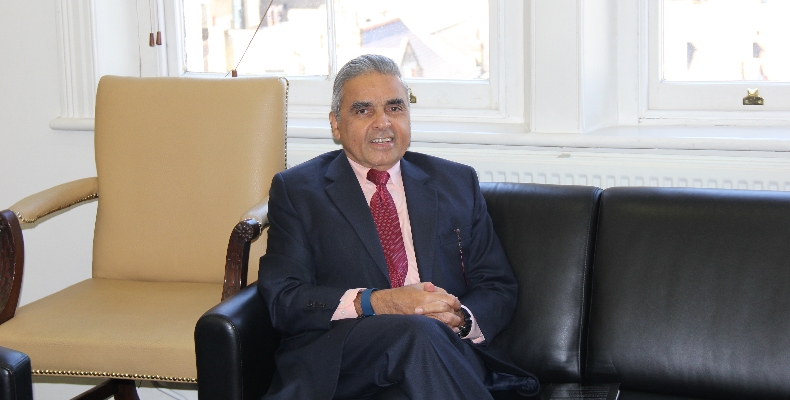Driving commercial and political engagement between Asia, the Middle East and Europe
Driving commercial and political engagement between Asia, the Middle East and Europe
Driving commercial and political engagement between Asia, the Middle East and Europe

Member states of regional Southeast Asian bloc the Association of Southeast Asian Nations (ASEAN) could be torn between their loyalties towards China and the USA as rivalry between the two superpowers grows in the coming decade.
Four ASEAN member states have signed up to the Trans-Pacific Partnership (TPP), a regional free trade agreement among 12 countries, which includes the USA, but excludes China.
“There will be enhanced rivalry between the USA and China in the coming decades and the negative side of that rivalry is that ASEAN member states may be forced to choose between the two and none of them want to,” said the Dean of the Lee Kuan Yew School of Public Policy at the National University of Singapore (NUS) Professor Kishore Mahbubani.
He told Asia House that the US and China were both proposing “geopolitical goodies” to the regional association of 10 member states.
He said the US was proposing TPP so it could “remain in the game” in Asia, whilst China, for its part, had started the Belt and Road initiative, which many ASEAN nations were participating in. “As part of that China is going to make major investments in infrastructure and so on,” Professor Mahbubai said in an interview with Asia House which took place following a private lunch with Asia House corporate members.
“ASEAN is going to go through a rough patch in the coming decade because US and China rivalry will rise,” he said.
“As China appears to become a larger economy than the US, US anxieties will rise and the US will look for opportunities to embarrass China and one of them will be the South China Sea and that will mean that ASEAN countries will get caught in the middle,” he explained.
Both China and the US should be very careful about dealing with ASEAN because if they push it too hard it may break apart, and it is noone’s interests to see the collapse of ASEAN, he said, pointing out the organisation had in fact brought peace to a region that used to be on a knife-edge.
ASEAN and regional peace
“One of the biggest contributions ASEAN has made is that it has brought peace to the Balkans of Asia,” Professor Mahbubani, who is also a former President of the UN Security Council, said.
“No part of the planet is as diverse as ASEAN, which has a population of 600 million: that includes 250 million Muslims, 100 million Christians and 150 million Buddhists. It is the most diverse part of the planet and despite that, ASEAN has created a culture of cooperation in the region.
“Before ASEAN was founded in 1967, bilateral relations were tense and difficult between most of the member states. As a result of the regular ASEAN meetings, personal networks develop and tensions are alleviated,” he explained.
ASEAN, a regional association of 10 Southeast Asian nations, is projected as a bloc to be the fourth largest economy in the world by 2050.
It is now the third largest economy in Asia and the seventh largest economy globally.
It has been the second fastest growing Asian economy over the past decade with a combined GDP of US$2.8 trillion in 2014 and a combined population of 625 million, almost twice the size of the USA and half of China’s.
“I don’t think ASEAN will ever become a superpower,” Professor Mahbubani said.
“The paradox of ASEAN is that its strength lies in its weakness. It is perceived to be weak so everyone trusts it. It is the only place where the leaders of ASEAN countries can come to comfortably without feeling threatened,” he said.
ASEAN is already playing a significant role in the world by acting as a catalyst for peace, he explained.
“For example China and Japan, if they have differences, they go to an ASEAN meeting and break the ice,” he said.
But he said ASEAN will never become a force like China or Japan. “It does not have a single foreign policy. It’s the opposite of the EU. The EU has tried to bring countries together under a single foreign policy. ASEAN will never do that.
“Nor will it ever have a single currency after watching the problems of the euro,” he said.
He said there were areas of the EU that ASEAN wanted to emulate and areas it did not. “ASEAN will never have free movement of workers or a single currency because ASEAN countries are very different in size, culture and so it would not work. We already have a degree of movement of skilled labour in the region, such as nurses,” he said.
“Most of the time ASEAN has learnt positive lessons from the EU,” he said. “The EU for example has had zero wars and zero prospect of wars. ASEAN has had zero wars but has not yet achieved zero prospect of war.”
Professor Mahbubani is the author of five books including Can Asians Think? and Can Singapore Survive?
His sixth book, which is coming out early next year is titled The ASEAN Miracle: Catalyst for Peace.

“ASEAN is a strange beast. It moves like a crab: two steps forwards and one step backward,” Professor Kishore Mahbubani said in an interview at Asia House this week
The EU’s ‘existential problem’
“One of the problems of the EU is it remains a ‘Christian club’ so Turkey can’t get in,” he continued.
“It is a mono-civilisational club but, by engaging with ASEAN, the EU would learn to deal with a multi-civilisational club. Otherwise it is going to face existential problems from North Africa for the next 100 years. The best way for the EU to solve the problems it has with refugees is to encourage North African countries to become successful like Indonesia and Malaysia. By engaging with ASEAN, this could be achieved,” he added.
Stalled EU-ASEAN FTA
Negotiations for a region-to-region EU-ASEAN FTA were launched in 2007 with seven ASEAN member states but both sides agreed to pause the negotiations in March 2009 to give way to bilateral FTA negotiations. “ASEAN is very keen on it,” Professor Mahbubani continued.
“But, as you know, the EU is very slow in its FTA negotiations.
“In the past, the main obstacle has been the membership of Myanmar in ASEAN. They used to preach to us saying not to include Myanmar. But, in fact, I have said in my book that the EU should now apologise for criticising ASEAN for inviting Myanmar to join because our engagement has enabled a peaceful and political transition to take place in Myanmar.”
He pointed out that FTAs were not the be all and end all. “They are economic agreements. In practice, they happen only if there is a geopolitical logic to them,” he said.
“So it will depend on if the EU sees the value of ASEAN,” he explained.
Brexit impact
“In the case of ASEAN the key lesson we have learnt from Brexit is ‘don’t make integration too tight and rigorous’,” Professor Mahbubani, a former diplomat said. “A looser association is better than a tight one. We are an association, not a union,” he said.
“Brexit has shown the wisdom of having a looser association rather than a union.”
He added Brexit had had no direct impact on ASEAN as it [Britain] was “too far away”.
UK-ASEAN FTA
“ASEAN would consider an FTA with the UK most definitely,” added Professor Mahbubani, who was listed by Prospect as one of the top 50 global thinkers in 2014.
“If the UK wants to fast track the negotiation process, it should take the Australia or New Zealand FTA as a template as both countries are similar to the UK culturally and both have similar legal environments and so on.
“If the UK did that, they could negotiate a FTA with ASEAN within a year,” he said, adding that the UK economy was bigger than Australia, New Zealand’s and South Korea’s – countries which ASEAN had already signed FTAs with.
If the UK is smart, it will “rush to” have an agreement with ASEAN because ASEAN has had a lot of practice of FTAs, he said, pointing out the organisation has signed FTAs with India, Japan, South Korea, China, Australia and New Zealand.
ASEAN integration
So how does Professor Mahbubani view the prospects for deeper ASEAN integration, called for by the likes of CIMB Group chairman Nazir Razak and others?
“ASEAN countries make commitments to open up their economies but when it comes to it they will stall,” he said.
“However, ASEAN countries over time will open up more and more.
“Aviation has already opened up a lot. The integration of banking and finance has been slow. There should be greater cooperation between the stock exchanges of ASEAN countries but there isn’t at the moment,” Professor Mahbubani, who is also a former Ambassador to the United Nations, said.
But ASEAN’s trade with the rest of the world has “gone up massively”, he pointed out.
“Intra-ASEAN trade as a percentage of global trade has remained constant but look at the volume of intra-ASEAN trade – it has gone up. Intra-ASEAN trade, investment and tourism have all gone up which are concrete indicators that show that ASEAN economies are growing,” the author said.
“ASEAN is a very unusual beast, a strange beast. Most people misunderstand it because it is not going forward in a straight line so there is lots of slow motion. It moves like a crab: two steps forwards and one step backwards,” he explained.
“But if you slice the last four decades up and look at it decade by decade, you will find in each decade ASEAN is moving forward in a big way and that’s the mystery of it,” he said.
So is that the ASEAN way?
The ASEAN way is a term used by many politicians to describe how ASEAN operates based on consultation and consensus of all nations, he explained. All countries respect each other and no one state tries to control the organisation. “If there is a slower road, ASEAN will always take it,” he said.
Opportunities for UK businesses
ASEAN’s purchasing power is expected to double within 15 years with an expanding middle class.
So are UK businesses aware of the opportunities?
“No,” Professor Mahbubani said.
“UK businesses don’t even know where ASEAN is. But the region is ripe for investment. ASEAN has a bigger middle class than India,” he pointed out.
naomi.canton@asiahouse.co.uk
On Friday 16 September Lord Green of Hurstpierpoint and Chairman of CIMB Group Nazir Razak are among the speakers at an Asia House signature conference, ASEAN on the global stage, being held in partnership with KPMG. For more information click here.
Asia House is running series of programmes on Brexit to advise and inform members on the way to navigate the extraordinary shift in the economic and political landscape. To find out more click here.
Could TPP and Asia-Pacific ‘mega FTA deals’ give a boost to post-Brexit UK trade? HE Mr Koji Tsuruoka, Ambassador of Japan to the United Kingdom, and Sir Alexander Lockwood Smith KNZM, High Commissioner of New Zealand to the United Kingdom, will brief Asia House corporate members on the TPP, other key developments in trade across the Asia-Pacific region and related opportunities for both the UK and EU on 21 October. For more information click here.
